Phil Bergey
philb@designforministry.com
In my two most recent blog entries I outlined a series of trends faced by the church at large and by Franconia Mennonite Conference specifically. This final blog entry—completing the trends trilogy, shall we say, focuses on three key opportunities for learnings that bear additional reflection as I complete my leadership role with Franconia Conference.
The learnings grow out of the need for Franconia Mennonite Conference to strengthen its sustainability and focus its mission. As congregations have been spending more on their local ministry presence, financial giving to the conference and church-wide has been decreasing. So over the past decade FMC has been risking by exploring new scenarios. As noted in the previous blog:
- One [scenario] was to re-organize and/or re-allocate FMC properties so they could help underwrite administrative expenses and augment the decline from congregational dollars. Another was to move some FMC staff to a fee-for-service format, creating Mennonite Resources Network (MRN). And another was to unite all FMC-related ministries into a relational network of Conference Related Organizations (CROs).
A quick look at each.
FMC Properties
 From my perspective church-owned properties are a mixed bag. It’s like the proverbial “can’t-live-with-‘em and can’t-live-without-‘em.” They take a lot of money to build or buy, money and time to maintain, and can overwhelm the purpose for which we originally intended to use them.
From my perspective church-owned properties are a mixed bag. It’s like the proverbial “can’t-live-with-‘em and can’t-live-without-‘em.” They take a lot of money to build or buy, money and time to maintain, and can overwhelm the purpose for which we originally intended to use them.
Among Franconia Conference learnings in working with properties, it has become clearer than ever that property must contribute strategically to the mission of the conference or they will take more energy than they provide. A simple goal was that the properties would not use up any contributed dollars but that instead they would collectively carry their own expense and even contribute to administrative expenses of running a conference.
In order to assess decisions about properties, Franconia Conference has become more intentional about including the gifts of people who truly understand properties, such as a realtor, property manager, attorney or other profession that works with properties for a living. Keeping the focus on the Conference’s mission sometimes means changing the use of a property and sometimes selling a property.
For about ten years Franconia Conference owned a 12-acre, 3-building campus on Yoder Road in Harleysville, Pa. For multiple reasons it became clear to Conference leaders that it would be to the church’s advantage if the conference would sell this property to one of the long-term tenants, Mennonite Historians of Eastern Pennsylvania (MHEP). Although some people initially questioned the Conference Board’s decision to move in this direction, most now agree it was a mutually beneficial decision that secures the future of MHEP, the ministry organization that the conference relies on to keep its historical record into the future.
Mennonite Resources Network (MRN)
The concept for MRN emerged around 1997 along with other significant changes that surfaced around that time (including the move from program-based commissions to a board-based leadership model). MRN began originally with two main focii: web-based communications and a platform to provide consulting.
The MRN web site evolved into at least three things: 1) a web site for Franconia Conference, 2) a web site for Eastern District Conference, and 3) on-line sales of resources that eventually was acquired by Design For Ministry, a consulting company which purchased MRN’s assets and liabilities.
MRN’s consulting model allowed Franconia Conference to focus its mission and core processes and to tidy up its staffing commitments that had become too broad and unwieldy for the future. This happened in several ways. At the time Conference leaders were trying to simplify a primary mission (equipping leaders…), the ability to move remaining staff to MRN offered a new start. MRN in turn became a proving ground and launching pad for staff to move into a consulting pattern for ministry.
Along the way a difficult learning was that entrepreneuring within the church is even more challenging than in other settings. Innovation involves risk—relationally, financially and organizationally. Newness requires outstanding communication. New initiatives need to be focused and made tangible for people to value them. Franconia Conference leaders generally, including me particularly, learned some of these fully during the years of developing MRN.
Yet despite the challenges, additional benefits related to experimenting with MRN included several partnerships between Franconia Conference and Mennonite World Conference, income from a creative partnership with Ted & Lee Theatre Works, and opportunities to shape the early stages of Mennonite Church USA. The consulting format of MRN also prepared the way for Franconia Conference to move from overseers to conference ministers and consultants as a way of equipping leaders to empower others to embrace God’s mission.
Conference Related Ministries (CRMs)
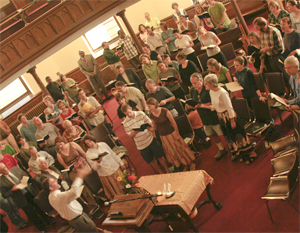 Some of you are familiar with the acronym CRO, which stood for Conference Related Organization. This was an initiative to bring together the many ministry organizations that relate to Franconia Conference from schools to camps to retirement communities to many others. The goals of this initiative was to clarify the relational commitments and shared vision with these many ministries, and to create a relational network that the CROs would help to support financially as they grew. Both of these goals paralleled the congregations’ relationships with the conference.
Some of you are familiar with the acronym CRO, which stood for Conference Related Organization. This was an initiative to bring together the many ministry organizations that relate to Franconia Conference from schools to camps to retirement communities to many others. The goals of this initiative was to clarify the relational commitments and shared vision with these many ministries, and to create a relational network that the CROs would help to support financially as they grew. Both of these goals paralleled the congregations’ relationships with the conference.
Along the way it became clear that the term CRO needed to give way to CRM to highlight that these are not simply conference related organizations, but ministries. A key learning for Franconia Conference leaders is that mutual benefit leads to sustainability. CRMs must see ways in which they benefit by participating with the rest of the church. And the church, whether the conference or the congregations themselves, must deepen its ownership of these church-related ministries for a healthy and long-term partnership.
One learning from our shared life together is that some congregations are taking on more of a CRM-like character while some of the CRMs are developing congregation-like aspects. A few simple examples of the first include congregations that also run child-care centers (early education) or have facilities that require staff to run events held there by groups not directly related with the congregation. Examples of the second include retirement communities that have worshipping “congregations” on site and chaplains who are truly “pastors” for those they serve daily, and schools and camps that play enormous roles in discipling young people much like congregations do.
Clearly whatever learnings we’re gaining from developing an intentional CRM relational system have only begun to surface. What seems imperative to me as I leave is that mutual benefit, healthy relationships, and overall sustainability of both CRMs and congregations will need to be central.
In addition to these three areas of learnings above, more could be said about the Partners in Mission relationships that has developed, or about how financial support policies have moved from multi-year subsidies to one-time grants oriented toward impacting change, or about other things that have emerged over the past ten years or so. Other Franconia Conference leaders will surely pick these up.
As trends among us will continue to impact the way we do church together, and as change swirls all around us, we can be assured of at least one thing. God is faithful, and God’s Spirit has been given to us to lead us into whatever lies ahead (John 16:12-15).
*Note: Phil resigned from his Franconia Conference executive role on August 31, 2007, after more than 14 years as conference executive. In additional to beginning doctoral studies in human and organizational systems and executive coaching, Phil continues to provide consulting and coaching services through Design For Ministry, including an executive leadership role with Mennonite Church USA.

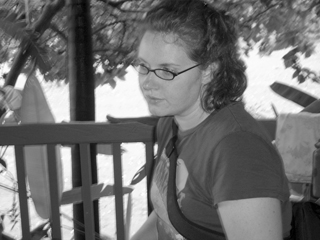 In the middle of July, I packed my bags and headed south to be an Orientation Leader for Eastern Mennonite Seminary’s LEAP program. LEAP, which stands for Learning, Exploring, and Participating, is a three week theological and cross-cultural exploration experience for high school students who have been recognized in their churches as rising leaders. The program guides students from urban, rural, and suburban backgrounds through a week of theological reflection focusing on where God is calling them and then sends them off to experience and witness how God is moving in another culture. This year the LEAP trips included Trinidad and Tobago, Mexico City, and Guatemala (my trip). As an Orientation Leader my job was to act as a chaperone, Resident Assistant, shepherd, guide, moral booster, encourager, friend, and Big Sister.
In the middle of July, I packed my bags and headed south to be an Orientation Leader for Eastern Mennonite Seminary’s LEAP program. LEAP, which stands for Learning, Exploring, and Participating, is a three week theological and cross-cultural exploration experience for high school students who have been recognized in their churches as rising leaders. The program guides students from urban, rural, and suburban backgrounds through a week of theological reflection focusing on where God is calling them and then sends them off to experience and witness how God is moving in another culture. This year the LEAP trips included Trinidad and Tobago, Mexico City, and Guatemala (my trip). As an Orientation Leader my job was to act as a chaperone, Resident Assistant, shepherd, guide, moral booster, encourager, friend, and Big Sister. I began to ask some of the same questions that the students on our trip were wrestling with too. One evening in the middle of our trip I sat down on the shore of Lake Petén Itzá with Gilberto and talked with him about the poverty in his native country as we watched women and men wash clothing and themselves in the lake as well as fill barrels for drinking water. As our conversation ended Gilberto went back to reading his newspaper and I sat silently reflecting that I had suddenly changed. I now had a new question that lingers with me: How can I go back to life as normal when I know more about the pain of this world and have allowed this experience to change me?
I began to ask some of the same questions that the students on our trip were wrestling with too. One evening in the middle of our trip I sat down on the shore of Lake Petén Itzá with Gilberto and talked with him about the poverty in his native country as we watched women and men wash clothing and themselves in the lake as well as fill barrels for drinking water. As our conversation ended Gilberto went back to reading his newspaper and I sat silently reflecting that I had suddenly changed. I now had a new question that lingers with me: How can I go back to life as normal when I know more about the pain of this world and have allowed this experience to change me?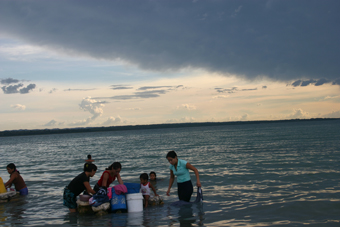
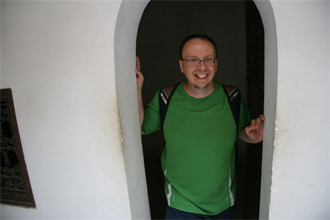 We were sitting in a train, knee to knee with two college students from North Jersey who had taken the summer to trek through Europe, side by side with two Moroccan women in traditional garb who were traveling with a teenage boy with bright and eager eyes. We conversed back and forth with the Jersey students who were finishing their trip across Europe with a quick jaunt into Morocco.
We were sitting in a train, knee to knee with two college students from North Jersey who had taken the summer to trek through Europe, side by side with two Moroccan women in traditional garb who were traveling with a teenage boy with bright and eager eyes. We conversed back and forth with the Jersey students who were finishing their trip across Europe with a quick jaunt into Morocco. How do you measure a year? In daylights, in sunsets, in midnights? In cups of coffee, in inches, in miles, in laughter, in strife?
How do you measure a year? In daylights, in sunsets, in midnights? In cups of coffee, in inches, in miles, in laughter, in strife?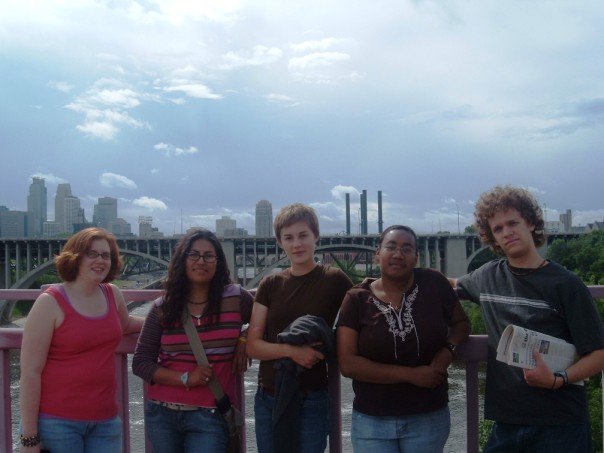 As the death toll rose to nine on Sunday evening, my thoughts turned to the recent events along Interstate 35W in Minneapolis. What most don’t know is that there is a small Mennonite community that gathers just blocks from where the 35W bridge collapsed. This emergent community is called Missio-Dei.
As the death toll rose to nine on Sunday evening, my thoughts turned to the recent events along Interstate 35W in Minneapolis. What most don’t know is that there is a small Mennonite community that gathers just blocks from where the 35W bridge collapsed. This emergent community is called Missio-Dei.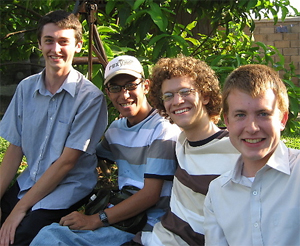 Living in Srok-Khmer (Cambodia) for three months as part of my Study/Service Term at Goshen College taught me a lot. As I worshiped and lived with my Christian host family within a mostly Buddhist nation, I learned how church is an extension of our being. Rarely did I have the chance to see my host brothers and sister from 5-9pm, because they were always at church.
Living in Srok-Khmer (Cambodia) for three months as part of my Study/Service Term at Goshen College taught me a lot. As I worshiped and lived with my Christian host family within a mostly Buddhist nation, I learned how church is an extension of our being. Rarely did I have the chance to see my host brothers and sister from 5-9pm, because they were always at church.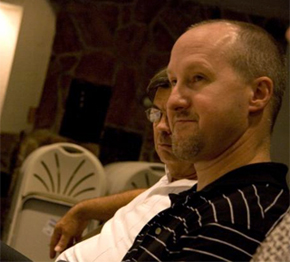 Phil Bergey
Phil Bergey 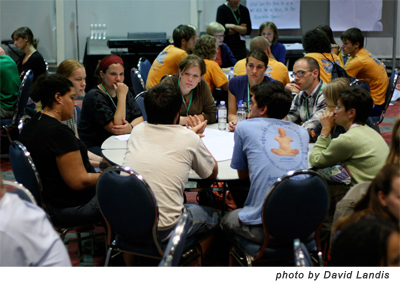 Regarding “our” schools, there are reasons why some have chosen not to send their kids to Mennonite schools. From my perspective I wish all kids could attend Mennonite schools. My three sons have had life-changing experiences within the contexts of Mennonite education. My focus here is not to cajole, persuade or harass everyone into sending their kids to Mennonite schools, but rather to encourage our schools to take their strengths to the whole constituency. Home-schoolers could use a variety of services that Mennonite schools could provide very well. Public schoolers also could benefit from some of the services. Obviously all of this would require collaboration on everyone’s part, better use of technology than we have done to date, and openness of heart and spirit all the way around. But I believe the creativity and relationships could be good for everyone involved.
Regarding “our” schools, there are reasons why some have chosen not to send their kids to Mennonite schools. From my perspective I wish all kids could attend Mennonite schools. My three sons have had life-changing experiences within the contexts of Mennonite education. My focus here is not to cajole, persuade or harass everyone into sending their kids to Mennonite schools, but rather to encourage our schools to take their strengths to the whole constituency. Home-schoolers could use a variety of services that Mennonite schools could provide very well. Public schoolers also could benefit from some of the services. Obviously all of this would require collaboration on everyone’s part, better use of technology than we have done to date, and openness of heart and spirit all the way around. But I believe the creativity and relationships could be good for everyone involved. My life’s been a little different in the past few months. And it’s kind of weird saying that now — that it’s different. But it really is. In a lot of ways, so many ways that I don’t think I could really begin to explain it all. I guess I just needed to get away. I needed to go somewhere and think about things, to distance myself from all that I’ve known and force myself into a new place, both literally and figuratively.
My life’s been a little different in the past few months. And it’s kind of weird saying that now — that it’s different. But it really is. In a lot of ways, so many ways that I don’t think I could really begin to explain it all. I guess I just needed to get away. I needed to go somewhere and think about things, to distance myself from all that I’ve known and force myself into a new place, both literally and figuratively. I’ve also compared it to waking up alone in the woods and having no idea where to go. Yes, that sounds a little scary. And it is. I don’t see how it wouldn’t be. But when you slow down and purposely push everything out of the way that distances you from pain, suffering, emptiness and meaninglessness that seems to weasel its way into every aspect of life, that’s what it feels like. It feels like you’ve just woken up and looked around and realized that you have no idea where you are. And that you don’t even know how long it will take ’til you get to somewhere familiar.
I’ve also compared it to waking up alone in the woods and having no idea where to go. Yes, that sounds a little scary. And it is. I don’t see how it wouldn’t be. But when you slow down and purposely push everything out of the way that distances you from pain, suffering, emptiness and meaninglessness that seems to weasel its way into every aspect of life, that’s what it feels like. It feels like you’ve just woken up and looked around and realized that you have no idea where you are. And that you don’t even know how long it will take ’til you get to somewhere familiar. Since I’ve come to the Walnut Hill congregation here in Goshen, I’ve had nothing but this amazing experience revolving around amazing people. Time and time again I’ve tried to retreat back into my own little world of me, I, and me. Time and time again God thrusts more and more of the neatest people into my life. People that convince me there’s still so much good in the world, “and that it’s worth fighting for.â€
Since I’ve come to the Walnut Hill congregation here in Goshen, I’ve had nothing but this amazing experience revolving around amazing people. Time and time again I’ve tried to retreat back into my own little world of me, I, and me. Time and time again God thrusts more and more of the neatest people into my life. People that convince me there’s still so much good in the world, “and that it’s worth fighting for.â€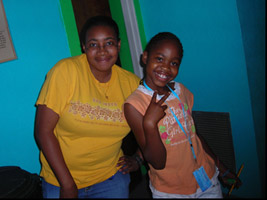 New Beginnings Community Church is in its third year of holding a children’s summer program. Members of the congregation have noticed the lack of activities for the children in their community and set out to make a difference. They set out to have a day camp, providing lunch, bible lessons, and plenty of arts and crafts. I have been truly blessed to have been a part of this ministry for the past three years, through the ups and the downs.
New Beginnings Community Church is in its third year of holding a children’s summer program. Members of the congregation have noticed the lack of activities for the children in their community and set out to make a difference. They set out to have a day camp, providing lunch, bible lessons, and plenty of arts and crafts. I have been truly blessed to have been a part of this ministry for the past three years, through the ups and the downs.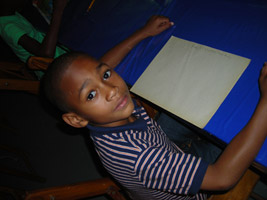 Unlike last summer, I encountered more and more off-the-cuff questions, which often catch me off guard. I wonder if they save them just for me to answer.
Unlike last summer, I encountered more and more off-the-cuff questions, which often catch me off guard. I wonder if they save them just for me to answer.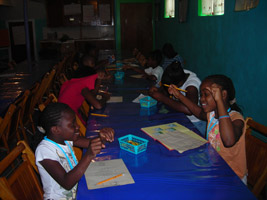 It is in sharing our situations and questions that we all benefit from the answers. It could be something that I have gone through already that may help my brother or sister sitting next to me. To begin this type of communication I must be available to listen. In the end, I’m glad that they feel comfortable in asking and challenging me with their questions, whether or not they always wait for an answer. Most of all, being there to give them an answer back makes me joyful and keeps me on my toes.
It is in sharing our situations and questions that we all benefit from the answers. It could be something that I have gone through already that may help my brother or sister sitting next to me. To begin this type of communication I must be available to listen. In the end, I’m glad that they feel comfortable in asking and challenging me with their questions, whether or not they always wait for an answer. Most of all, being there to give them an answer back makes me joyful and keeps me on my toes.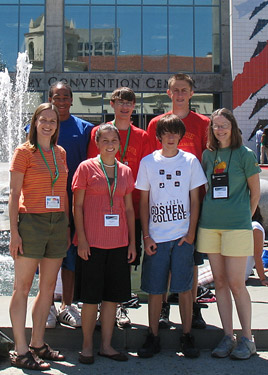 As I am writing this article and reflecting on the Mennonite Youth Convention in San Jose, I am turning a small polished rock over and over in my hands. Inspired by a song in the musical Godspell, during which a character puts a pebble in his shoe at the start of a journey, my youth leader instructed everyone in our group to chose a rock to accompany us to San Jose. Though we kept our rocks in our pockets instead of in our shoes, they were nonetheless notable traveling companions. Individually and together, we assigned meaning to our rocks throughout the trip.
As I am writing this article and reflecting on the Mennonite Youth Convention in San Jose, I am turning a small polished rock over and over in my hands. Inspired by a song in the musical Godspell, during which a character puts a pebble in his shoe at the start of a journey, my youth leader instructed everyone in our group to chose a rock to accompany us to San Jose. Though we kept our rocks in our pockets instead of in our shoes, they were nonetheless notable traveling companions. Individually and together, we assigned meaning to our rocks throughout the trip. Besides wrestling with my own calling, I witnessed the larger church struggle with its calling during convention. I’ve enjoyed looking at how the three conventions I’ve attended have built on each other. From being a welcoming body, to speaking up about our faith, the Mennonite church has grown to this theme of living the call. Living the call happens inside of every believer, in the body of Christ, and it overflows into our communities and the world.
Besides wrestling with my own calling, I witnessed the larger church struggle with its calling during convention. I’ve enjoyed looking at how the three conventions I’ve attended have built on each other. From being a welcoming body, to speaking up about our faith, the Mennonite church has grown to this theme of living the call. Living the call happens inside of every believer, in the body of Christ, and it overflows into our communities and the world.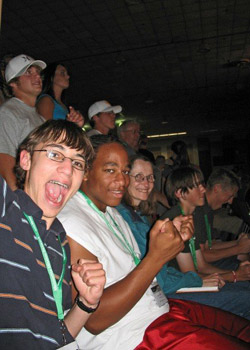 In my more cynical moods I question why I went to convention. I wonder about the hundreds of dollars and the hours spent fundraising that could have gone to needs right at home or in anywhere around the globe. Did I really need to be flying cross country, eating in delicious ethnic restaurants, and sleeping on a wonderfully plush bed? Well, no. Convention leaves a lot to be desired as far as stewardship of resources goes, but convention is invaluable for the way it unites the Mennonite Church. Gathering pools our resources, energizes us for our daily Christian walk, and gives us a better picture of the body of Christ. Convention gives us a sense of who we are, who we’d like to become in Christ, and how Christ can work through us for that transformation to occur.
In my more cynical moods I question why I went to convention. I wonder about the hundreds of dollars and the hours spent fundraising that could have gone to needs right at home or in anywhere around the globe. Did I really need to be flying cross country, eating in delicious ethnic restaurants, and sleeping on a wonderfully plush bed? Well, no. Convention leaves a lot to be desired as far as stewardship of resources goes, but convention is invaluable for the way it unites the Mennonite Church. Gathering pools our resources, energizes us for our daily Christian walk, and gives us a better picture of the body of Christ. Convention gives us a sense of who we are, who we’d like to become in Christ, and how Christ can work through us for that transformation to occur.